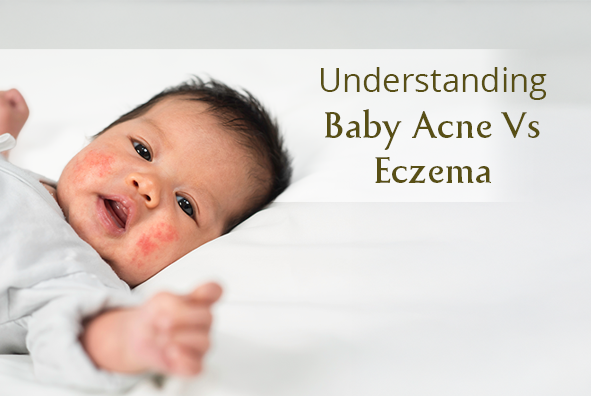Are you aware that a newborn’s skin is much more delicate than an adult’s and also more prone to irritation? That’s why skin issues like baby acne and eczema are fairly common. In fact, around 20% of newborns experience baby acne, and 1 in 5 children under the age of 2 are affected by eczema.
While both conditions may seem similar, they’re not the same. In this blog, we’ll walk you through baby acne vs eczema—including the causes and symptoms—so you can manage them effectively. Let’s get started!
What Is Baby Acne?
Baby acne (also called neonatal acne) is when small red or white bumps show up on a newborn’s face — mostly on the cheeks, chin, or forehead. It looks a bit like adolescence acne, but are totally normal and harmless.
Baby Eczema—What Is It?
Baby eczema (also called atopic dermatitis) is a skin condition that shows up as dry, red, and itchy patches on the baby’s skin. It usually appears on the cheeks, scalp, arms, or legs.
Baby Acne Vs Eczema: Differences To Know
Baby Acne
1. When Does It Happen?
Baby acne usually appears around 2 weeks after birth. Sometimes it’s already there when the baby is born.
2. Causes of Baby Acne
Many experts believe it’s due to hormones from the mother that pass to the baby during pregnancy. These hormones make the baby’s oil glands more active, which leads to extra oil (sebum) production. The pores of baby’s skin can be blocked by excess sebum, thereby resulting in small bumps known as baby acne.
3. Is It Painful?
No. Baby acne doesn’t hurt, itch, or spread from one baby to another. It may look a bit rough, but it doesn’t affect your baby.
4. Does It Need Treatment?
Nope. Baby acne will go away on its own without any medical treatment. It may take a few weeks or a few months. All your baby really needs is gentle care.
Baby Eczema
1. When Does It Happen?
Unlike baby acne, eczema doesn’t go away quickly on its own. It stays around for weeks or more and may need proper treatment.
2. Causes Of Baby Eczema
Some of the causes of eczema include:
Hereditary – If the parents suffer from allergy, asthma, or eczema, the infant may also develop it.
Sensitive immune system – The baby’s body might overreact to some environmental allergens.
Environmental or surrounding triggers: Dust, detergents, or abrasive soaps can also irritate the baby’s skin and cause eczema.
3. Is It Harmful?
No, it’s not! But eczema can make your baby uncomfortable due to itching and dryness.
4. Is Treatment Required?
Yes, only if the baby’s skin cracks or the infection spreads, rather than healing.
Now that you know the main differences between baby acne and eczema, keep reading to understand how you can manage their symptoms.
5 Tips For Managing Baby Acne & Eczema
Here are some easy tips to care for your baby’s infected skin (whether it’s baby acne or eczema):
1. Opt For Gentle Products
Harsh soaps and scented products can dry out a baby’s skin or trigger eczema. Fragrances, natural or synthetic—often contain allergens that can trigger flare-ups or dryness. That’s why it is always recommended to parents to opt for fragrance-free, baby-safe cleansers. They will not strip your baby’s skin of its natural moisture.
2. Limit Bath Time
Bathing your baby too often can disrupt their skin barrier. 2–3 lukewarm baths a week are usually enough, unless your doctor suggests otherwise.
3. Be Gentle While Bathing
If your baby’s nails are long, accidental scratching can irritate the bumps further. Keep their nails trimmed and avoid harsh rubbing during baths to prevent worsening the condition, if any.
4. Moisturise Daily
Use a baby-friendly, hypoallergenic moisturising cream, particularly if your baby has eczema. It helps lock in moisture, soothes dryness, and strengthens the skin barrier. Apply it right after bathing for best results.
If you’re on the hunt for safe, effective skincare for baby acne or eczema, Areoveda’s Moisturising Baby Spray Lotion and Deep Moisturising Baby Cream are worth a try. Both these products provide 72 hours of hydration, help soothe baby acne, and relieve dryness. Moreover, the brand (AreoVeda) is EWG verified, Ecocert certified, and lab-tested on human skin cells. This means that their products are gentle and safe for babies right from day 1.
5. Keep It Cool
Too much heat or sweat can further irritate your baby’s skin. So, it is advisable to keep your little one’s room cool. And also dress them in soft, breathable layers of clothes.9
When To See A Doctor?
If you’re doing everything right but the rash continues to spread or ooze, always consult a doctor. They can recommend a medicated cream or treatment to soothe your baby’s skin.
The Final Say
Now that you’re at the end of this blog, don’t forget to share it with other new parents in your circle! As you know, understanding the basics of baby acne vs eczema is really important for caring for your little one’s skin. Nonetheless, if you ever get stumped, just reach out to your pediatrician—they’re just a phone call away!

